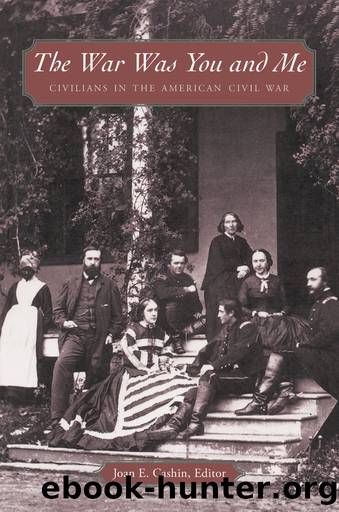The War Was You and Me by Joan E. Cashin

Author:Joan E. Cashin [Cashin, Joan E.]
Language: eng
Format: epub
Tags: History, United States, Civil War Period (1850-1877)
ISBN: 9780691218113
Google: Tc3xDwAAQBAJ
Publisher: Princeton University Press
Published: 2020-09-01T01:13:44+00:00
IV
The actions of the governor and the civilians of his state reveal patterns in the content of American national identity in the nineteenth century. Based on the overall performance of Curtin and Pennsylvania throughout four years of horrific struggle, one could hardly characterize either the person or the population as disloyal; however, the state did contain vigorous dissent that influenced how the governor attacked recruitment. It caused him to decide arbitrarily to cut the term of military service in July and to employ a softer hand in organizing soldiers into regiments. Community values, shared by persons across class and political lines, dictated some of the measures possible for raising soldiers in the Keystone State in 1862. These included shorter military service than three years, the need for bounties to protect families, the desire to form new regiments with familiar men from the same community, and the hope to remain home if performing work acknowledged as valuable for either family or neighborhood. The public attitudes that shaped these policies mirrored those of Confederate civilians who had experienced the prior April the encroachment of the nation-state in the form of the first national draft in American history.
Unlike Southerners, the most disaffected persons in the Union increasingly found expression through political channels, with the Democrat Party becoming the opposition to the administration. Similarly, Republicans began to look upon men who stayed out of the war â especially unattached males or certain immigrants â as disloyal. Those who remained home at the end of the recruitment drive could be stigmatized by Republicans as disloyal men, especially if they had no apparent means of support and/or hung around the local taverns. But even if a person sought work, he could be branded as suspect in his loyalties. A man from central Pennsylvania wrote the governor in September, âIn my countryâs troubles I have given all my sons . . . and am entirely left alone to do the farming, and hardly a man can be hired as all the young able bodied men from these parts are gone to war except some few semi-loyal.â39 This quotation suggests that other factors than oneâs usefulness to the home front started entering into the picture of how to assess the loyalty of a civilian.
Northern identities were not more ânationalâ than their Southern cousinsâ âat least not consistently so, and especially if one defines nationalism as recognition of the nation-state as the supreme or primary loyalty. Instead, a personâs imagined community in nineteenth-century America led through a hierarchy that began with the family, then the neighborhood, fanning out to embrace church, sewing circle, tavern, township, county, state, and then Union or Confederacy. The locality did not serve the interest of the nation, but the nation-state had to represent, protect, and nurture the interests of the locality.
This created a situation ripe for dissenting views of what the larger entity should be. The United States, after all, represented a fairly young club in which the members still argued about the rules and procedures.
Download
This site does not store any files on its server. We only index and link to content provided by other sites. Please contact the content providers to delete copyright contents if any and email us, we'll remove relevant links or contents immediately.
| United States | Abolition |
| Campaigns & Battlefields | Confederacy |
| Naval Operations | Regimental Histories |
| Women |
In Cold Blood by Truman Capote(3374)
The Innovators: How a Group of Hackers, Geniuses, and Geeks Created the Digital Revolution by Walter Isaacson(3145)
Steve Jobs by Walter Isaacson(2889)
All the President's Men by Carl Bernstein & Bob Woodward(2363)
Lonely Planet New York City by Lonely Planet(2216)
And the Band Played On by Randy Shilts(2197)
The Room Where It Happened by John Bolton;(2150)
The Poisoner's Handbook by Deborah Blum(2132)
The Innovators by Walter Isaacson(2096)
The Murder of Marilyn Monroe by Jay Margolis(2094)
Lincoln by David Herbert Donald(1981)
A Colony in a Nation by Chris Hayes(1927)
Being George Washington by Beck Glenn(1910)
Under the Banner of Heaven: A Story of Violent Faith by Jon Krakauer(1788)
Amelia Earhart by Doris L. Rich(1687)
The Unsettlers by Mark Sundeen(1682)
Dirt by Bill Buford(1669)
Birdmen by Lawrence Goldstone(1662)
Zeitoun by Dave Eggers(1643)
